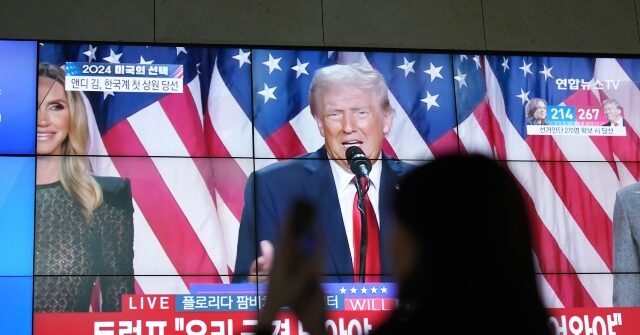
Kim Tae-hyo, deputy national security adviser to South Korean President Yoon Suk-yeol, said on Wednesday that Seoul will “work to establish a perfect Korea-U.S. security posture with the new Washington administration to ensure unwavering national security.”
Kim said South Korea wants to create a “stronger, more dynamic global comprehensive strategic alliance” with the United States.
Another senior South Korean presidential official said that “communication between President Yoon Suk-yeol and the president-elect will be arranged promptly” to discuss the possibilities for increased cooperation.
South Korea dispatched career diplomat Lee Tae-woo to Washington in March for accelerated negotiations on the renewal of the Special Measures Agreement (SMA), an agreement first established in 1991, because Seoul was concerned Trump would win the 2024 election and demand higher contributions for defense.
Trump and his defense secretary, Mark Esper, both remarked that “wealthy” South Korea should pay more for its own defense during the first Trump administration. South Korea was offering a 13 percent increase at the time, while Trump had something closer to 400 percent in mind.
South Korea managed to renew the SMA for five years with the Biden administration in October, with only an 8.3 percent increase to $1.09 billion in annual contributions. At around the same time, Trump described South Korea as a “money machine” in an interview with Bloomberg News and said it should be paying $10 billion a year.
Bloomberg reported on Monday that South Korea made plans to increase oil and gas imports from the United States if Trump won the election in a bid to mollify Trump by reducing South Korea’s trade imbalance with America:
Officials in Seoul have been holding meetings with businesses and think tanks in recent weeks to discuss post-US election strategies. After Trump started his previous term, South Korea rushed to find ways to boost energy purchases from the US, according to two people familiar with the matter.
The government could approach major oil importers and ask them to raise the share of US purchases, although this doesn’t always result in the expected increase, the people said. This time, geopolitical risks in the Middle East might provide extra incentive for companies to turn to the US for imports, they added.
South Korean refiners reportedly believe increasing crude oil imports from the United States would be good business, because the American supply is currently more profitable than Middle Eastern imports.
According to Bloomberg, South Korea is also developing a public relations campaign to convince the second Trump administration, and Republicans in Congress, that South Korean companies are increasing their investments in the United States and hiring more American workers.
President Yoon offered congratulations to President-elect Trump early Wednesday morning on social media platform Twitter.
“Under your strong leadership, the future of the ROK-U.S. alliance and America will shine brighter. Look forward to working closely with you,” Yoon wrote. ROK is the Republic of Korea, the official name of the South Korean government.
Gallup International took a poll before the election that found 83 percent of South Koreans believe the outcome of the 2024 U.S. presidential election would affect their country. This was the highest percentage Gallup found when asking that question in 43 different countries.
Gallup’s poll found that 71 percent of Koreans preferred Vice President Kamala Harris as a candidate, compared to only 16 percent who preferred Trump. Over half of Koreans said they expected America’s standing in the world to “deteriorate” if Trump won.
South Korea apprehensively watched North Korea make several provocative moves before the U.S. election, including a major intercontinental ballistic missile (ICBM) test last week and a barrage of short-range ballistic missiles fired into the Sea of Japan on Tuesday, mere hours before the presidential election got under way.
